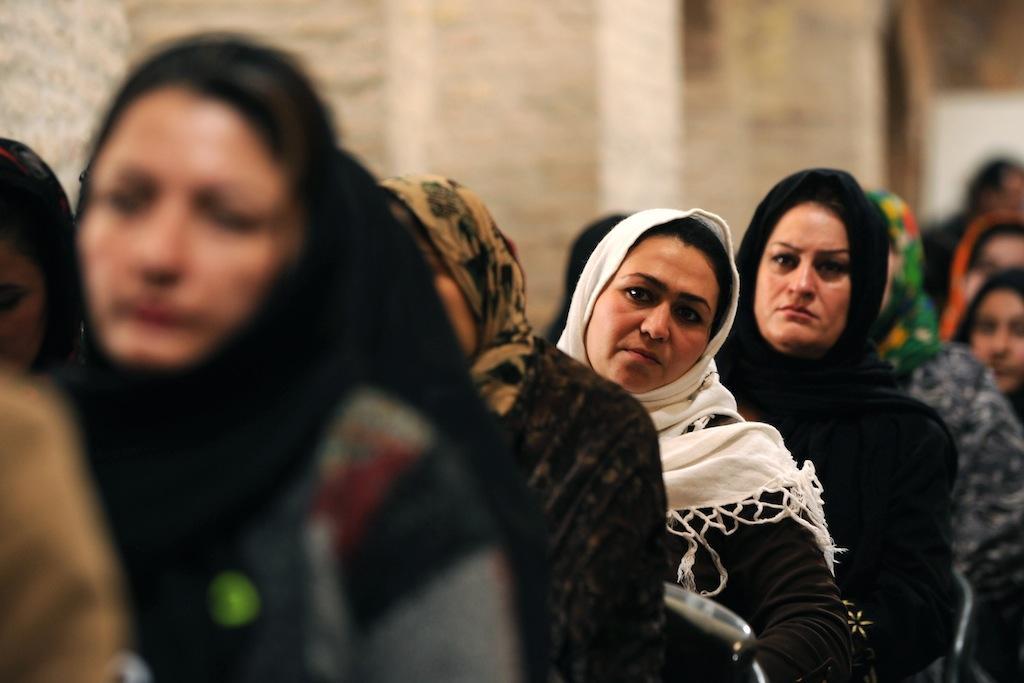Afghanistan celebrates International Women’s Day with first women’s film festival
Afghan women attend the first-ever International Women’s Film Festival in Afghanistan, in the city of Herat on March 7, 2013. The film festival, a novelty for Afghanistan, opened on the eve of International Women’s Day, and presented thirty films from twenty countries, including Afghanistan, Iran, India, Canada, South Korea, China and Bangladesh.
The city of Herat in western Afghanistan marked International Women’s Day by launching the first Herat International Women’s Film Festival on March 7 through 9, a remarkable step forward for both women and cinema in Afghanistan.
Khalida Khursand, one of the festival organizers, explained to the United Nations Assistance Mission in Afghanistan (UNAMA) that the purpose of the festival is “to encourage women folk in filmmaking, promote a culture of film watching and to contribute to the welfare of women in Afghanistan through art.”
The history of film in Afghanistan has been a complicated one. Throughout the 1960s and 1970s, the industry looked promising as aspiring Afghan filmmakers studied at prestigious institutions in the Soviet Union and Iran. However, war throughout the 1980s and 1990s limited film production and when the Taliban came to power in Kabul in 1996, all cinemas were closed.
More from GlobalPost: A short primer on the 57th annual UN CSW
Since 2001, things have slowly been coming back to life. In 2003, Afghan filmmaker Siddiq Barmak directed the internationally acclaimed “Osama,” a movie about a young girl living in Afghanistan under Taliban rule. “Buzkashi Boys,” a live action short co-produced in Afghanistan and the US was just nominated for an award at the 2013 Oscars. The Afghan Film Project, a non-profit organization working to rebuild the Afghan film industry, used the film as an opportunity to provide hands-on training for the primarily Afghan crew.
In Herat, the festival organizing committee selected 30 films from around 100 submissions on the topic “women,” 40 of which were produced by Afghans. International entries came from a variety of countries, including the United Kingdom, Pakistan, and Turkey.
Reflecting on the status of women today, whether through film or other means, is particularly important in a country like Afghanistan. While the past decade has brought some notable improvements to the lives of Afghan women, many problems remain. A recent UNAMA report, “Still a Long Way to Go,” finds that acts of violence perpetrated against women are still ongoing and underreported, despite a 2009 law making such acts illegal.
More from GlobalPost: Will Fawzia Koofi be Afghanistan's next president?
Another report published in 2012 by Human Rights Watch details the widespread problem of the brutal incarceration of women for “moral crimes,” which includes escaping domestic violence or forced marriages.
In spite of such challenges, many Afghan women are making strides in their efforts for greater political and social roles in their country. Some recent female graduates from Herat University are participating in Herat’s promising IT services sector by starting their own companies. In the relatively peaceful Bamyan Province, Dr. Habiba Sarabi has served as Afghanistan’s first female governor since 2005. Afghanistan sent the country’s third female athlete to compete in the London Olympics last summer. Fawzia Koofi, one of 69 female members of Afghanistan’s lower house of parliament, even plans to run for president in 2014.
With the upcoming transition the county faces as US and NATO troops withdraw from next year, Afghanistan will need more than a few good women. Fortunately, it looks like there are several already leading the way.
More from GlobalPost: On International Women's Day, marking the progress we have made — and haven't
We want to hear your feedback so we can keep improving our website, theworld.org. Please fill out this quick survey and let us know your thoughts (your answers will be anonymous). Thanks for your time!
